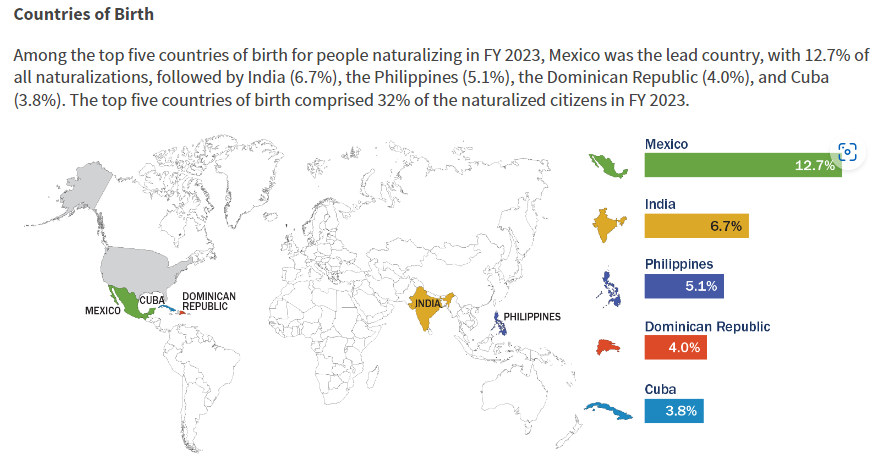Last Updated: February 12, 2024, 10:10 IST
Washington D.C., United States of America (USA)
People on personal watercraft drive past the Statue of Liberty and Liberty Island in New York Harbor during hot weather in New York City, New York, U.S., July 12, 2023. (Reuters)
Over 59,000 Indians became US citizens in 2023, securing the country’s second-place spot after Mexico. Learn about naturalisation requirements and trends
More than 59,000 Indians were naturalised as US citizens in 2023, according to the US Citizenship and Immigration Services (USCIS). The annual report by USCIS, for the fiscal year that ended September 30, sheds light on the major contribution Indians make to American demographics.
This figure put India as the second-largest source country for new citizens, trailing behind Mexico, which accounted for over 1.1 lakh new US citizens, constituting 12.7% of the total naturalisations. Meanwhile, 44,800 people from the Philippines and 35,200 from the Dominican Republic were also granted US citizenship, according to the USCIS report.
In FY23, the USCIS workforce worked tirelessly to uphold America’s promise as a nation of welcome & possibility by reducing backlogs, improving customer experience, addressing humanitarian needs, & strengthening employment-based immigration.Learn more: https://t.co/Q1HAbgMH76 pic.twitter.com/0QTxaCBaYx
— USCIS (@USCIS) February 9, 2024
‘Multicultural US’
The United States has a long history of welcoming immigrants from all parts of the world. During the last decade, USCIS welcomed more than 7.7 million naturalized citizens into the fabric of its nation. These numbers underscore the multicultural fabric of the United States, shaped by immigrants from around the world. The naturalisation process, governed by the Immigration and Nationality Act (INA), entails meeting specific eligibility requirements set forth by the USCIS. These requirements typically include being a lawful permanent resident (LPR) for at least five years.
However, the report detailed special provisions within the INA that exempt certain applicants from fulfilling all general naturalisation criteria. Notably, spouses of US citizens and individuals with military service may be eligible for expedited naturalisation under specific circumstances. The USCIS said that most individuals naturalised last year qualified based on their status as LPRs for at least five years.
Applicants who were LPRs for at least three years and married to US citizens for the same duration also constituted a significant portion of new citizens. Individuals eligible for naturalisation based on military service during designated periods of hostilities were recognised for their contributions to national defence and were among those granted citizenship.




